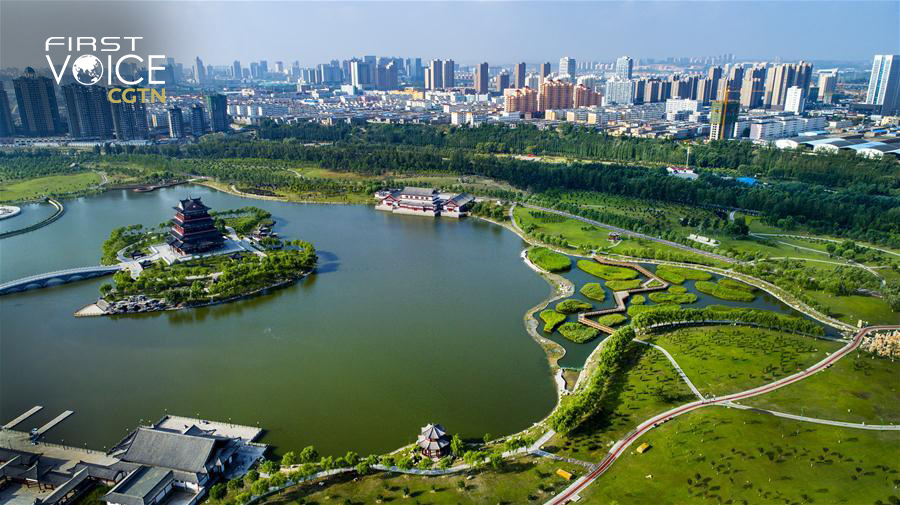
Editor's note: CGTN's "First Voice" provides instant commentary on breaking stories. The daily column clarifies emerging issues and better defines the news agenda, offering a Chinese perspective on the latest global events.
Chinese President Xi Jinping's speech at the Leaders Summit on Climate on Earth Day at the invitation of U.S. President Joe Biden offers a rare sign of hope for joint global action to protect the future of humanity.
When facing global challenges like the COVID-19 pandemic, some nations have resorted to finger-pointing and blame to hide their own weaknesses or try to gain petty short-term political advantages - at the cost of hundreds of thousands or even millions of lives.
But at this moment, the dangers facing humanity are too grave for these sorts of political games. The clear and present danger posed by climate change is not in doubt. Each year brings new record-breaking temperatures, extreme droughts, deadly wildfires, and more frequent and powerful hurricanes.
Snow cover and permafrost are retreating, and the polar ice caps and mountain glaciers are disappearing.
The well-funded efforts of entrenched corporate interests can no longer hide the risks to humanity. In fact, corporate leaders have realized that their profits are coming under threat from climate change.
It is a positive sign for the international global system that on the issue of climate change, nations are setting aside their differences to come together.
During his speech, Xi on April 22, reaffirmed China's climate commitments to strictly limit its coal consumption and strive to peak carbon emissions by 2030 and achieve carbon neutrality by 2060.
This will be an extraordinarily heavy lift for China - no developed nation has proposed to go from peak emissions to carbon neutrality so quickly.
However, as China showed by eliminating poverty and controlling COVID-19 when the country's people are faced with a major challenge, the nation is capable of launching a whole-of-government response to protect its people, achieving results that were once considered impossible.
Reducing carbon emissions even as the living standard of China's people continues to rise is a challenge unlike any country has faced before.
Nonetheless, Xi has laid a detailed blueprint for these changes in its 14th Five-Year Plan for 2021 to 2026.
President Biden ahead of the Summit also announced a major initiative to reduce carbon emissions - marking a welcome turnaround from the climate change denialism of the previous administration.
Biden's administration has vowed to cut its carbon emissions by at least half by the end of the decade. The Biden administration says its efforts have already helped secure improved carbon reductions from Japan, Argentina and Canada.

An agricultural field next to Highway 101 in Salinas Valley, California, U.S., April 5, 2021. /Getty
An agricultural field next to Highway 101 in Salinas Valley, California, U.S., April 5, 2021. /Getty
The examples of major nations, including China focusing their resources on countering climate change will serve as an example to persuade every country to step forward do its part.
Speaking at the virtual conference via video link in Beijing, Xi vowed to work with the international community, including the U.S., to advance global environmental governance.
With the slogan "green mountains are gold mountains," Xi emphasized that there needs not to be a contradiction between improving living standards and environmental protection.
China is already a leader in green technologies such as wind and solar power generation, and the switch from carbon-based energy offers economic opportunity as well as costs. Some political groups around the world try to paint action against climate change as a pure drag on the economy that will hurt common people.
Xi emphasized that pursuing green development can mean improving the lives of people, and people need to feel a sense of benefit.
Any plan to fight climate change needs to take into full account people's longing for a better life and for a good environment. With careful planning, both goals can be achieved. As Xi noted in his speech, protecting the environment is protecting productivity, and improving the environment is improving productivity.
The health threat presented by COVID-19 brought into sharp focus that many of the problems facing humanity are global in nature and require a global solution.
Carbon emissions are an urgent issue, but the poisoning of the ocean and the skies, the rapid extinction of species, emerging global health threats and gaps in wealth leading to mass migrations are other examples of pressing problems that require nations to work together for the shared future of humankind.
Hopefully, global cooperation on climate change can light a pathway that leads to further cooperation in these areas. This requires a commitment to multilateralism, international law, and the United Nations-led global system.
It is natural for nations to compete for advantage in various fields, but they must not lose sight of the most important thing - their responsibility to hand a clean and beautiful better world to future generations.
(If you want to contribute and have specific expertise, please contact us at opinions@cgtn.com.)

